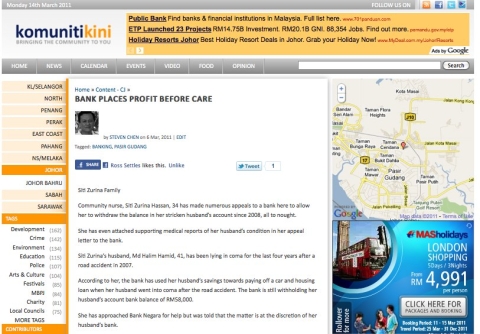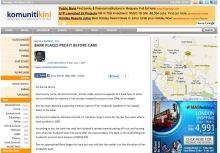

In the two months since the launch, I have been working closely with the new editor Jason Tan, the head of MalaysiaKini’s Citizen Journalism program, Maran Perianen, and the CEO Premesh Chandran to improve the site, add new features, and expand the audience. We huddle around the Google Analytics dashboard every morning to see what’s working. But, it took a letter from Bank Negara Malaysia, Malaysia’s central bank, to make us realize that in addition to traffic growth - the site is growing about 15% per week - that "the model" was actually starting to work.
Over the past month, Steven Chen the head of the Citizen Journalism chapter in Johor Bahru, Malaysia’s second largest city, contributed a story on the plight of a local nurse in Pasir Gudang, Mrs Siti Zurina Hassan. In 2007, Mrs Hassan’s husband was left in a coma after an auto accident. Four years later, Mrs Hassan was appealing to her husband’s bank for access to his savings in order to pay for medical bills and support the family. The local commercial bank had refused her requests and she had appealed to the regional office of Bank Negara Malaysia for redress. The last line in the story says, “Attempts to contact the bank’s head office went unanswered.”
Three days later, Bank Negara Malaysia responded. It was an expected response, there was no record of Mrs. Siti’s complaint. But it was recognition from one of Malaysia’s most important bureaucracies that they were paying attention to the complaints of one struggling single mother in Pasir Gudang as reported by a trained concerned citizen journalist.
It was a small, ephemeral recognition. Local news is usually like this - not sexy, just daily. Citizen journalists across Malaysia are covering daily examples of community issues and inequities:
Potholes on a crucial rural Sabah highway,
Racially motivated dismissals in a high school in Perak, and
The bureaucratic struggles of a single mother in Pasir Gudang.
CJ’s are covering local stories in Malaysia and KomunitiKini is distributing the news to both the community and to those who have the power to address the reported problems and inequities. Two legs of the model seem to be working, now if I could just get an ad from a local Johor merchant to go along with Steven Chen’s story that would be an online publishing trifecta. But I guess an ad from Malaysian Airlines is also one form of recognition.